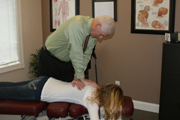How Does Chiropractic Promote Overall Wellness?
Chiropractors know that adjustments are good for your general health. Millions of satisfied patients cannot be wrong. But what do chiropractors know that the rest of us do not?
They know the nervous system is the one system in the body that directly affects every other system. This is because nerves conduct sensory information from every part of the body and then delivers this information to the brain. Once there, the brain analyzes the information to determine what the body needs to maintain a healthy state. So the health of this system is paramount to the good health of the rest of the body.
Chiropractors recognize that misalignment in the spine can interfere with proper nervous system function. More specifically, chiropractors study the effects of vertebral subluxations – conditions of the spine where align- ment and/or movement patterns of the vertebrae are abnormal. When this occurs, imbalances cause irritation and inflammation. In turn this can cause interference with information that is transmitted along nerves and spinal cord. Chiropractors are the only health care professionals specifically trained to locate and correct spinal subluxations.
This is the principal reason why chiropractors should be called wellness doctors. Every time a chiropractor corrects a vertebral subluxation, the positive effects are felt in multiple systems simultaneously.
Where’s the Proof?
For decades, scientific research has focused on the use of chiropractic adjustments for low back pain, neck pain and headaches. In fact, there is now clear evidence to recommend chiropractors as the go-to professionals for spinal pain syndromes. However, with the rising popularity of wellness-based philosophies focused on non-traditional approaches to health, chiropractors are being asked to justify their role.
The traditional medical model of symptom-based healthcare is rapidly waning. We no longer feel we have to be sick to call upon a health professional for advice. Instead, we are focusing more on the detrimental effects stress has on our bodies, and the therapies that address the mind-body connection are getting much more attention.
In a recent report from the Center for Disease Control, the four most popular forms of alternative and complementary medicine were listed as: natural products, deep breathing, meditation and chiropractic!
People are casting their votes with their healthcare dollars and chiropractors are taking a leadership role in this new wellness model. As a profession whose core philosophy is about the optimization of the brain-body communication network, chiropractic can be viewed as a therapy with an emphasis on whole body health and wellness
Research is catching up to what chiropractors have known for years. In a recent study that reviewed all the available research to date, investigators found that “chiropractic adjustments, often for the purpose of correcting vertebral subluxation, confer measurable health benefits to people regardless of the presence or absence of symptoms.” More people are seeking what chiropractic offers: optimization of health and an improved quality of life, with a spine free of vertebral subluxations!
In a multi-nation study involving hundreds of chiropractors and thousands of chiropractic patients, researchers sought to measure the incidence of non-musculoskeletal responses to chiropractic therapy. What they found was that a number of patients experienced systemic benefits from their chiropractic treatments whether or not they mentioned any symptoms in these areas at the onset of care. The most common benefits reported in this study were breathing (27%), digestion (26%) and circulation (21%).
In yet another ground-breaking study, chiropractic adjustments were shown to actually decrease blood pressure, one of the leading causes for preventable death in North America (in relation to the incidence of heart-attacks and strokes). The study stood up to medical scrutiny and showed unequivocally that vertebral subluxations – of the upper cervical vertebra in this case – can be detrimental to the health of the individual, and not just a pain in the neck.
From these research results, chiropractors clearly have a greater role in your health and wellness than just treating sore backs. Chiropractic care should be considered an invaluable tool for you to not only help you feel well, but to also help you be well.
References and sources:
1. Dagenais S, Gay RE, Tricco AC, Freeman MD & Mayer JM. NASS Contemporary Concepts in Spine Care: Spinal Manipulation Therapy for Acute Low Back Pain. Spine Journal 2010 (Oct.); 10(10): 918-940.
2. Bronfort G, Assendelft WJJ, Evans R, Haas M & Bouter L. Efficacy of Spinal Manipulation for Chronic Headache: A Systematic Review. J Manipulative Physiol Ther 2001 (Sept.); 24(7): 457-466
3. Thiel HW & Bolton JE. Predic- tors For Immediate and Global Responses to Chiropractic Manipulation of the Cervical Spine. J Manipulative Physiol Ther 2008 (Mar.); 31(3): 172-183.
4. Barnes PM, Bloom B, Nahin R. Complementary and Alternative Medicine Use Among Adults and Children: United States, 2007. CDC National Health Statistics Report #12. December 10, 2008.
5. Hannon SM. Objective Physiologic Changes and Associated Health Benefits of Chiro- practic Adjustments in Asymptom- atic Subjects: A Review of the Literature. J Vertebral Subluxation Research 2004 (Apr.): 1-9.
6. Leboeuf-Yde C, Pedersen EN, Bryner P, Cosman D, Hayek R, Meeker WC, Shaik J, Terrazas O, Tucker J & Walsh M. Self-reported Nonmusculoskeletal Responses to Chiropractic Intervention: A Multi- nation Survey. J Manipulative Physiol Ther 2005 (Jun.); 28(5): 294-302.
7. Bakris G, Dickholtz M, Meyer PM, Kravitz G, Avery E, Miller M, Brown J, Woodfield C & Bell B. Atlas Vertebra Realignment and Achievement of Arterial Pressure Goal in Hypertensive Patients: A Pilot Study. Journal of Human Hypertension 2007 (May); 21(5): 347-352.



